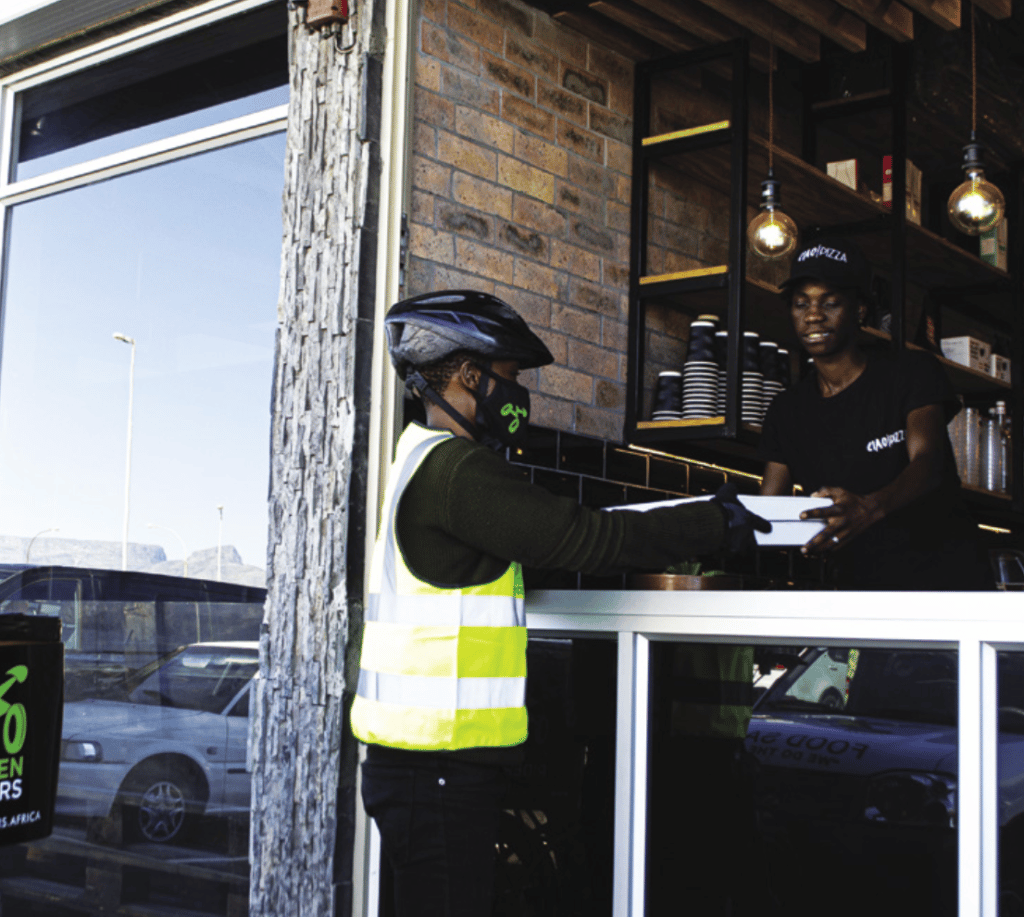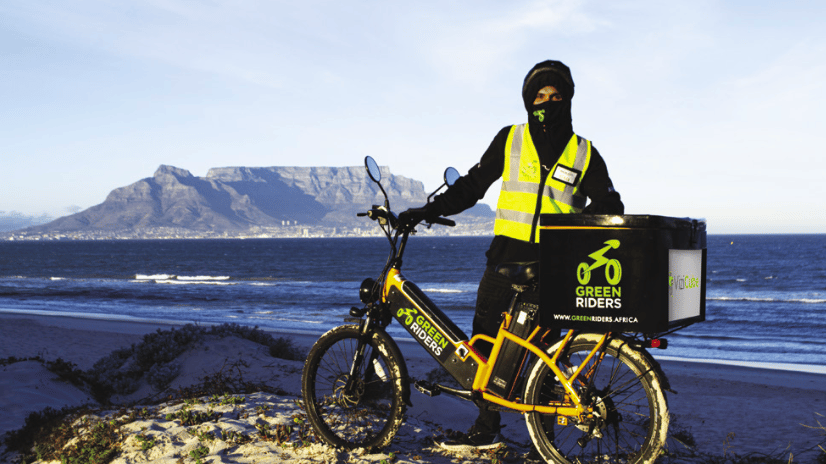With more demand for e-mobility options in recent times, a South African startup is now driving e-bikes as a game-changer in the delivery industry.
MOTORBIKES ARE UBIQUITOUS IN AFRICA, weaving through traffic as a mandatory motif in the continent’s bustling bazaars and raucous streets.

Consider the boda bodas of Kenya or the moto-taxis in Rwanda, and with the pandemic, the spurt witnessed in the number of professional delivery services, and sadly, with that, bike accidents too. In South Africa, Reuters reported a 30% jump in food courier-related accidents when lockdown restrictions slightly eased in mid-2020. Most online applications that offer food delivery services reportedly consider drivers as contractors and not employees, so they are not eligible for sick leave; they pay for their own bikes and helmets, and the insurance schemes offered often do not provide adequate protection, if they are offered at all.
But what if there was an alternative to the costly and dangerous way to deliver food in the gig economy?
It’s an e-bike, a 52MM high torque motor with a 1970WH dual battery that can go 90km-150km before needing another plug-in to charge. Sticking to current regulations, it goes 25kph.
If the right infrastructure, such as proper bike and bicycle lanes, comes into effect in Africa, e-bikes could be a game-changer – and not just for delivery workers.
Green Riders is one such brand.
If it runs out of juice, you don’t have to push it to a service center; trundle on until you find a power source. A ViziCube display on the back can play adverts – akin to outdoor advertising – creating another source of income for the drivers.
Warrick Ross, the Director of Green Riders, says about this feature: “Not only is this good for commercials, allowing for delivery riders that cannot rely only on the margins of delivery – that 12 rand, that 15 rand ($0.7/$0.9) – to make it sustainable. And this is why we think we’ve cracked it on the sustainability side.”
Not using petrol also significantly lessens driver costs, so it’s win-win.
“We are looking at focusing on activations as well. And because deliveries are done in a peak period, at lunchtime, and then at dinnertime. In the morning, there’s not much happening. So we could be doing an activation for a company; everybody lined up on the beach front, and everybody can earn a share of that activation fee for that day.
“And they’ve already, so trying to get creative on how these guys can earn, and
how we can maximize this whole commercial model,” Ross adds. Green Riders, initially called Pathway Cycles, has been in
the process of rebranding as well as expanding into different
e-vehicles. This comes after a Series A fundraising.
The startup was commercially launched in South Africa in
2020 by Craig Atkinson and Trevor Wentworth, with Ross as Director, tapping into the need for eco-friendly modes of transport in Cape Town as well as the new reliance on motorbike deliveries.
Ross says the demand for e-mobility options has shot through the roof, and there’s a real willingness to try it.
Green Riders currently employs 84 people. Working with big names like Bolt Food, RocoMamas, Midas, Roman’s Pizza, KFC and Waterfall City, they recently signed a contract to send 180 e-bikes to a company called eBee in Kenya, and have a partnership with another company in Morocco.
“I couldn’t overstress the love we have for Africa, as South Africans. So definitely, Africa is a core focus. And it’s also where the biggest opportunity happens to be. That’s just a blessed alignment.”
Ross and Atkinson stayed nearyby in the same complex and both quit their full-time jobs to pursue e-mobility options in South Africa. Ross says his co-founder Atkinson is the visionary, while he’s the numbers guy and director of operations the rest of the time.
It’s been a roller-coaster since they started.

Beyond Cape Town, Ross adds it will take five to 10 years to get the infrastructure for e-vehicles right in South Africa.
“It’s a national move that the country is [going] towards, and it’s just going to be a slow process. It’s not just for us, I mean, this needs to happen. And we are just all blessed to be a part of the consultation process.”
The regulations around e-bikes means it lowers the barriers of entry for riders and therefore opens up opportunities for employment, because you don’t need a driver’s license.
WhileyouhavetolearntherulesoftheroadwithGreenRiders, it’s still faster and easier, says Ross.
“And obviously that then feeds into the petrol price. Because even if you do go through the whole process and the cost of getting a motorbike, and your motorbike license, you’re not paying 50 to
100 rand per day on petrol ($3-$6). This is a very ugly industry, in that the driver gets squeezed; the aggregator is always going to charge the maximum fees possible.”
Core to Green Riders is not just making a difference to the planet, but to its people.
“We insure all our e-bikes for the riders that don’t insure it. And when you have a certain number of bikes in your policy, it’s actually not that expensive. You get that economy of scale.”
He adds that it’s just the right thing to do, for human safety and long-term viability.
According to Ross, they have sourced the best batteries in the market, for the longest life on the road.
Green Riders has partnered with accreditation facilitators and are in talks with others, as hosting providers for learnerships.
Ross explains that after this, there’s still need for upward mobility. Recruiting individuals and access to
a market is where they want to come in, to provide an e-bike that can be paid off at a rate the banks approve. He explains that this is a way for self-reliance, as they can acquire a bike, pay it off, and perhaps buy another one.
The workshops for the drivers can be in administration or technical applications like bike assembling.
“So it’s not mandatory, but we find the people who want to do more, asked to learn more, and then they’re able to do more and are able to learn more. So it’s just the right cycle.”
Another benefit to the workers is that Green Riders has created an integrated management system for accepting orders, so riders don’t have to minimize each app they get an order from, and can streamline
their acceptance of orders. This can improve their key performance indicators.
An integrated management system also benefits restaurants, because they have one tablet that they can accept orders from, instead of multiple devices, ringing often at the same time.
“And they don’t speak to one another so you end up having delays on your food. So it’s also good for the restaurant. And we found a lot of interest in this.”
The service has been going through development for months. Ross says April 1 saw the restaurant Ciao Pizza and another called The Charcoal Oven and Grill in Cape Townutilizethesystemwithgreatsuccess. Another bonus for the riders – a full charge on an e-bike to travel 90km-150km costs only R5.24 of electricity. That’s less than $1. It costs approximately $24 (R384) to go the same distance with petrol.
